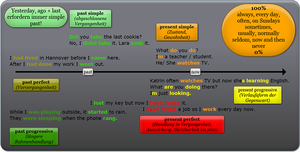Present Simple/Verneinung: Unterschied zwischen den Versionen
(akt) Markierung: Quelltext-Bearbeitung 2017 |
(akt) Markierung: Quelltext-Bearbeitung 2017 |
||
| Zeile 1: | Zeile 1: | ||
Im [[Tenses/Present Simple|Present Simple]] werden Verneinungen mit dem Hilfsverb '''''don't''''', bzw. '''''doesn't''''' in der [[Tenses/Present_Simple#3._Person_Singular|3.Person Singular]] und dem Hauptverb in der Grundform gebildet! | Im [[Tenses/Present Simple|Present Simple]] werden Verneinungen mit dem Hilfsverb '''''don't''''', bzw. '''''doesn't''''' in der [[Tenses/Present_Simple#3._Person_Singular|3.Person Singular]] und dem Hauptverb in der Grundform gebildet! | ||
Bei [[Tenses/Present_Simple#Verneinungen|Verneinungen]] im '''Present Simple''' wird das Hilfsverb <span style="font-weight:bold;color:orange;background: rgba(255, 165, 0,.1);"> don't </span> | Bei [[Tenses/Present_Simple#Verneinungen|Verneinungen]] im '''Present Simple''' wird das Hilfsverb <span style="font-weight:bold;color:orange;background: rgba(255, 165, 0,.1);"> don't </span> ( in der 3. Person Singular <span style="font-weight:bold;color:orange;background: rgba(255, 165, 0,.1);">doesn't</span>) vor das Hauptverb gestellt. | ||
Das Hauptverb wird dann nicht mehr verändert und bleibt in der | Das Hauptverb wird dann nicht mehr verändert und bleibt in der Grundform! | ||
== Interaktive Übungen == | == Interaktive Übungen == | ||
Version vom 11. November 2020, 06:17 Uhr
Im Present Simple werden Verneinungen mit dem Hilfsverb don't, bzw. doesn't in der 3.Person Singular und dem Hauptverb in der Grundform gebildet!
Bei Verneinungen im Present Simple wird das Hilfsverb don't ( in der 3. Person Singular doesn't) vor das Hauptverb gestellt.
Das Hauptverb wird dann nicht mehr verändert und bleibt in der Grundform!
Interaktive Übungen
My hamsters
Move the words into the gaps:
I've got two hamsters. They like their cage very much but they don't like their wheel.
Every day they eat their carrots but sometimes Harry doesn't eat salad and biscuits.
Be careful! A hamster is nocturnal: that means they don't sleep at night. They sleep during the
Sleeping in
In this exercise you have to choose the correct form. Write the in the gaps:
(In dieser Übung musst Du entscheiden, ob Du don't oder doesn't vor das Verb stellen musst.)
The Jacksons normally don't get up(not, get up) early on Saturdays but Pete gets up(get up) at 6.30.
Pete goes (go) out at seven o clock – the boys play (play) football in a team.
“Come on! The bus doesn't wait(not, wait)!” He hurries (hurry) out of the house.
The girls sleep (sleep) longer- they have more time.
Mary does (do) her homework. Anne doesn't do(not, do) it -she washes(wash) her shirts and socks.
Pete goes (go) out at seven o clock – the boys play (play) football in a team.
“Come on! The bus doesn't wait(not, wait)!” He hurries (hurry) out of the house.
The girls sleep (sleep) longer- they have more time.
Mary does (do) her homework. Anne doesn't do(not, do) it -she washes(wash) her shirts and socks.
Mixed Grammar
In this exercise you have to choose the correct form. Write don't oder doesn't and the verbs in the gaps:
1. In the morning Lewis gets (get) up at twenty past seven.
2. Lewis doesn't go (not, go) to school on his bike.
3. They live (live) in a house near the park but his dad doesn't live (not, live) there.
4. The boys don't play (not, play) football. Lewis does (do) his homework and Carl washes(wash) his bike.
2. Lewis doesn't go (not, go) to school on his bike.
3. They live (live) in a house near the park but his dad doesn't live (not, live) there.
4. The boys don't play (not, play) football. Lewis does (do) his homework and Carl washes(wash) his bike.
-s muss mit!
Present Simple
(die einfache Gegenwart)
Past Tense:
Present Tense:




